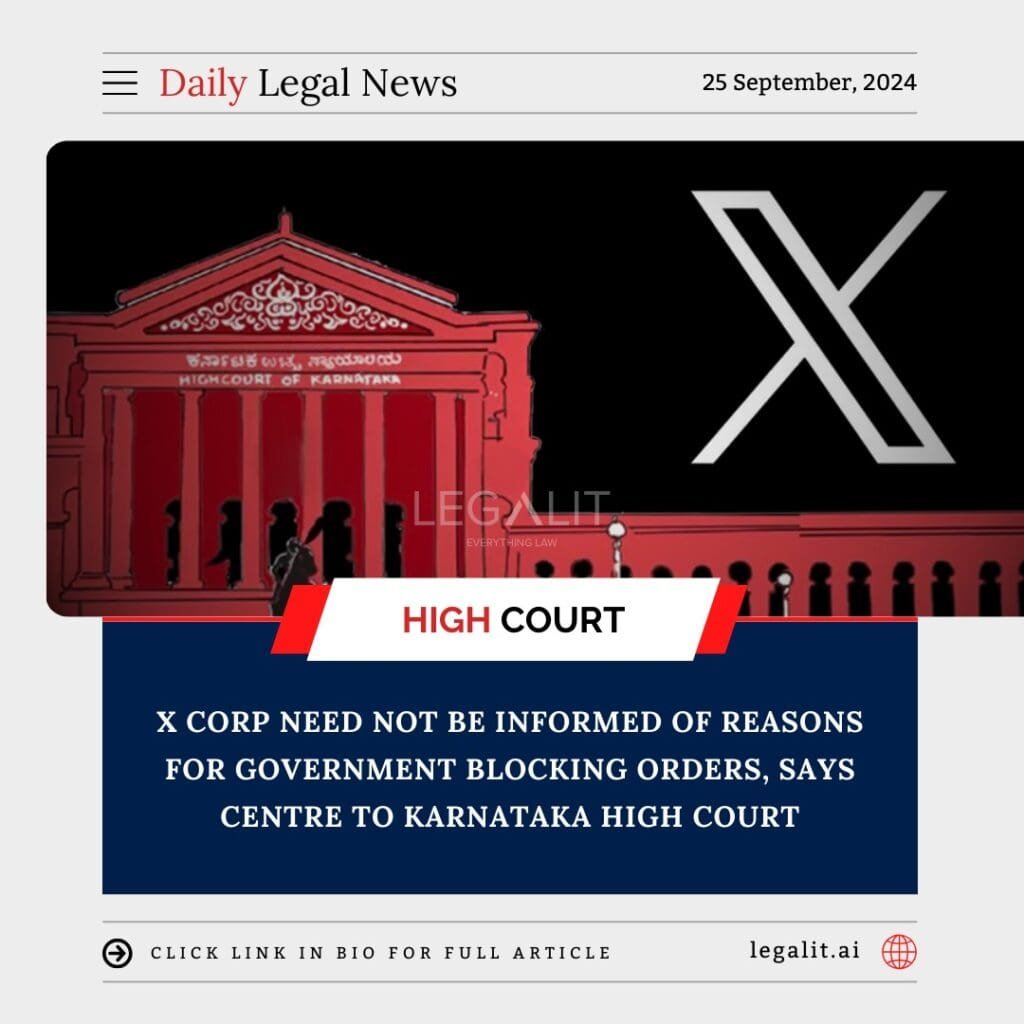
In a significant development, the Central Government has asserted before the Karnataka High Court that X Corp (formerly Twitter) does not have the right to know the reasons behind its directives to block user accounts or content on the platform. The government argued that disclosing such information could compromise national security, public order, and other sensitive matters that require strict confidentiality.
1. Background of the Case
The case revolves around X Corp’s challenge to the government’s orders to block certain accounts and tweets, issued under Section 69A of the Information Technology (IT) Act, 2000. The platform had approached the Karnataka High Court, questioning the legality of these orders and demanding an explanation for the rationale behind them.
X Corp has maintained that the government’s blocking orders, issued over the past year, were vague and did not provide specific reasons, thereby affecting its ability to comply effectively. The platform had earlier argued that this lack of transparency violated principles of natural justice.
2. Centre’s Stance on National Security
In response, the Centre strongly defended its position, arguing that revealing the reasons for blocking content on the platform could jeopardize sensitive government operations. The government highlighted that decisions to block accounts or posts are often based on classified intelligence inputs, which are shared only on a need-to-know basis to protect the sovereignty, integrity, and security of India.
The government cited Section 69A of the IT Act, which empowers authorities to direct intermediaries like X Corp to block online content without necessarily disclosing the specifics of the reasoning to the platform, especially when such actions involve national security or public order concerns.
3. Balancing National Security and Free Speech
The legal battle brings into focus the delicate balance between safeguarding national security and upholding the right to freedom of speech and expression, as enshrined in Article 19(1)(a) of the Indian Constitution. While platforms like X Corp advocate for transparency and accountability in government orders, the government contends that certain decisions need to be taken swiftly and discreetly in the interest of public safety.
The Centre argued that while free speech is a fundamental right, it is subject to reasonable restrictions, including those concerning national security, sovereignty, and public order. Therefore, X Corp’s demand for a detailed explanation of each blocking order could be incompatible with the government’s duty to protect the nation from potential threats.
4. X Corp’s Concerns Over Arbitrary Blocking
X Corp had raised concerns that the lack of transparency in government orders could lead to arbitrary and excessive blocking of accounts, thereby stifling free speech and expression on the platform. The platform argued that without knowing the reasons, it is difficult for it to ensure that only content violating Indian law is blocked, and not legitimate expression.
However, the government rejected these concerns, stating that all blocking orders are issued after careful consideration and are within the framework of the IT Act. It also emphasized that X Corp, as an intermediary, has a legal obligation to comply with such directions under Indian law.
5. Karnataka High Court’s Role and Future Proceedings
The Karnataka High Court is now faced with the challenge of evaluating the extent to which intermediaries like X Corp can demand transparency from the government regarding blocking orders. The court’s decision could set a significant precedent, shaping how similar cases are handled in the future.
The court is expected to consider both sides of the argument — the need to preserve national security and public order versus the right to free speech and the platform’s right to be informed about the reasoning behind blocking orders. The outcome will likely have broader implications for how online content is regulated in India and how global platforms interact with Indian authorities on matters of censorship and compliance.
6. The Bigger Picture: Regulation of Social Media in India
This case also highlights the growing scrutiny over social media platforms in India, where the government has increasingly taken steps to regulate content. With more users turning to online platforms for information and expression, the government has introduced several regulations aimed at curbing misinformation, hate speech, and content that could incite violence.
The IT Rules, 2021, introduced stringent guidelines for social media platforms to remove illegal content, comply with government orders, and appoint compliance officers. However, these rules have also raised concerns about the potential for government overreach and censorship, as platforms are often required to take down content without an independent review.
7. Conclusion: What Lies Ahead?
As the Karnataka High Court deliberates on this matter, the case will serve as a litmus test for how much transparency platforms like X Corp can demand from the government. While the Centre remains firm on the need for confidentiality in certain orders, the court’s decision will be crucial in defining the boundaries of government control over online content and the role of intermediaries in upholding free speech.
The ruling could have far-reaching implications, not only for X Corp but for all social media platforms operating in India. It remains to be seen whether the court will side with the government’s argument on national security or favor greater transparency and accountability in the process of blocking online content.